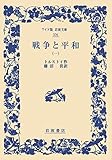過去のPDCA日記で、私が住所不定無職時代、カプセルホテルの中で色々な古典を読みふける日々を過ごしていたことを書いたのですが、「どんな古典を読んでいたのですか?」という質問を頂きました(皆、よく読んでいるなぁ…)。
カプセルホテルの中で読んだ古典の中に、今回紹介する「戦争と平和」があります。
本書はロシアの文豪トルストイの代表作であり、手にしたことがある方も多いと思います。
読破しようと思うとかなりエネルギーがいる大著ですが、住所不定無職だった私はやることがなかったので、熟読することができました(ラッキー!)。
実際に読まれた方はお分かりになると思いますが、この本はビジネスにおいても応用可能な記載が多く含まれています。
「戦争と平和」の主要登場人物として、ナポレオンとクトゥーゾフが知られています。
ナポレオンは言わずと知れたフランスの皇帝であり、戦場を事前に細かくチェックし、地形等も確認した上で作戦計画を準備し、実際の戦闘になると自ら前線を駆け回って兵士たちに詳細な命令を与える指揮官として描かれています。
一方、ロシア軍の総司令官だったクトゥーゾフは、ナポレオン軍がロシアに侵攻後、「モスクワ明け渡し」という有名な作戦を実行し、最終的に勝利を収めた大将です。
クトゥーゾフはナポレオンとは正反対のリーダーで、戦場に赴くこと等はせず、それどころか会議中に居眠りをするような人で、「動かない大将」と陰口を叩かれることもあったそうです。
ただ、戦争全体の大局を見極めていたのはクトゥーゾフであり、「モスクワを放棄してもロシアを失ったことにはならない」という有名なセリフを残して、モスクワからの退却を決定します。
ロシアに入ったナポレオンは冬将軍に苦しめられ、モスクワから撤退を始めた際、クトゥーゾフは「決してロシア国境を越えてフランス軍を追わないよう」全軍に指示を出しており、結果的に全ての判断が正しかったと「戦争と平和」の中で説明されています。
ナポレオンがロシアで失敗した背景に、「細かく決めすぎた」ことがあります。
「現実の戦闘は、指揮官の命令とは無関係に、刻々と変化する状況に瞬間ごとに反応する兵士たちの行動によって進行する」ためであり、「ナポレオンによって作られた『天才的な』作戦指令は、一つとして実行されなかった。そもそも、実行されるはずがなかった」とトルストイは述べています。
そう言えば、過去のPDCA日記で紹介した資料「だらしない人ほどうまくいく」の中で、「海兵隊の作戦行動」に関する以下のような記述がありました。
「(海兵隊の)事前の戦略会議は、計画の練り直しという二度手間を避けるため、つねに任務遂行の直前に行なわれる。
指示は個別具体的に出されるのではなく、大まかな目標や禁止事項に限定される。
状況が時々刻々変化する戦場で、特定の作戦行動に縛られるのは、うまいやり方とは言えない。」(引用終わり)
私がニューヨークで働いていた時、同僚だった元海兵隊員は「戦争と平和」をきちんと読んでおり、「近代戦でも役に立つ内容が記載されている」と話していました。
ちなみに、ウォール街の経営者の多くは、マルクスの「資本論」を読んでいます(理由を知りたい方は、PDCAカフェで!)。
20世紀最大の経済学者と呼ばれたケインズは、「正確に誤るより漠然と正しいほうがよい」という有名な言葉を残しています。
これは、「細部を少しくらい間違ってもよいが、全体の方向性を見誤ってはならない」という意味であり、大局観に基づくバランスの取れた判断がリーダーには求められているようですね :-)。
それでは、本日もPDCAを回して行きましょう!
PDCA日記が更新されたら通知が欲しいという方がいましたので、そのような場合は Twitter をご利用ください :-)。https://twitter.com/MPdca
P.S.「戦争と平和」は様々な出版社から発刊されていますが、今回紹介している「ワイド版岩波文庫」は随所に本編と無関係のコラムが入っています。
「ロシア人は伝統的な名前が好きで、『ニコライ』、『アンナ』など昔ながらの名前が普通で、日本のように両親が新しい名前を『発明』することはほとんどない」や、「ロシアに侵攻した60万のナポレオン軍は、大半が傭兵の外国人部隊だった」などの豆知識を吸収することもできます。
古典を読んでいると「長いなぁ~」と感じることがありますが、本書の場合はちょうどよいタイミングでコラムが登場しますのでお勧めです。
「戦争と平和」を俳句にすると以下のような感じで、就寝前に読むとよく眠れる本でもあります(笑)。
「この人(Mr. PDCA)は 俳句のセンス まるでない」- 俳句の偉い先生 -
< Mr. PDCAのボンジュール英語「古典」 = 「classic literature」>
今回出てきた「古典」の英訳は、「classic literature」になります。
辞書によっては、「classic」だけで「古典」としているところもありますが、日本語で「古典」と表現する場合は「古典文学」であることが一般的であるため、英語では「classic literature」と伝えれば分かりやすいですね :-)。
In the past PDCA Diary, I introduced "Habits of Ants", and I got many messages, such as comments from the person studying algorithms referencing the move of ants in college.
In the same post, I wrote that I was spending days to read various classics in the capsule hotel when I was an unemployed drifter, and the other colleague asked me that "What kind of classics were you reading?" (Everyone is meticulously reading the PDCA Diary :-)
Among the classic literatures that I had read in the capsule hotel, there was a book "War and Peace" which is to be introduced today.
This book is a masterpiece of Russian writer Tolstoy and I think that there are many people who have seen this book in the library or book store.
Although this masterpiece needs considerable energy to go through, I could read it carefully because I had nothing to do at that time (Lucky!).
Those who actually read "War and Peace" could understand, that this material contains many applicable descriptions in business.
Napoleon and Kutuzov are known as the main characters of "War and Peace".
Napoleon is an well-known French Emperor, who was checking the battlefield and the topography, etc., in advance, so as to prepare a strategy plan and run around the front line by himself and issued detailed orders to the soldiers when the actual battle started.
Kutuzov, commander of the Russian army, was a General who eventually won the Napoleonic army by implementing a famous strategy called "Fire of Moscow (Retreat from Moscow)".
Kutuzov was the opposite type of leader to Napoleon, because he did not go to the battlefield, and he was sometimes dozing off during the meeting.
Therefore, others called Kutuzov as "General without moving" in the shade.
However, it was Kutuzov who had been looking at the whole picture of the war, and decided to retreat from Moscow, by saying the famous words "Abandoning Moscow will not result in losing Russia."
Napoleon who entered into Russia was suffered by the severe cold winter and when the French army started withdrawing from Moscow, Kutuzov issued instructions to all Russian troops that "Never cross the Russian border and do not follow the French army."
As a result, all judgments by Kutuzov were correct according to Tolstoy in "War and Peace".
Tolstoy analyzes the root cause of Napoleon failure in Russia that, "He decided in details too much."
Tolstoy also says that "The actual battle progresses with the actions of soldiers reacting every moment to the ever-changing situation irrespective of the commander's orders", and "The genius strategy made by Napoleon was not executed at all."
By the way, the book "The Perfect Mess" introduced in the past PDCA diary also has the following description of Marines operation.
"The strategy meeting of the Marines operation is always carried out just before the mission in order to avoid the trouble of reworking the plan.
The instructions are not given in detail, but only rough targets and prohibitions are issued.
In a real battlefield, the situation changes from moment to moment, so it is not a good way to be bound by specific strategy actions." (Unquote)
When I worked in New York, there was a colleague who was a former Marines member (who appeared for the first time in a long time!).
He thoroughly read "War and Peace" and mentioned that "Contents of this book are still useful in the modern battlefields."
By the way, many executives at Wall Street are reading Marx's "Capital" (If you want to know the reasons, you need to come to PDCA cafe!).
John Maynard Keynes, the greatest economist of the 20th century, has left a famous phrase "It is better to be roughly right than precisely wrong."
This means "You might make a mistake a bit, but you had better correctly understand the overall direction" and it seems that the leaders are required to have a balanced decision based on the broad view.
Let's function PDCA today!
In case you would like to receive a notice at the time of PDCA Diary post, please utilize Twitter :-). https://twitter.com/MPdca

War and Peace (Oxford World's Classics)
- 作者: Leo Tolstoy,Louise Maude,Aylmer Maude,Amy Mandelker
- 出版社/メーカー: Oxford Univ Pr
- 発売日: 2010/11/10
- メディア: ペーパーバック
- この商品を含むブログを見る
P.S. "War and Peace" has been published by various publishers, but the "Iwanami Wide Edition (Japanese only)" introduced this time contains columns unrelated to the main story everywhere as below.
"Russians are fond of old-fashioned names such as 'Nikolai', 'Anna' and most children names are these traditional ones. In Japan, parents invent new names, but Russians don't have this sort of custom."
"Napoleon army had 600 thousand soldiers when they invaded Russia, but the majority were mercenary foreign troops."
While reading the classic literature, you may feel "Long!", but in this edition, interesting columns will appear at the right timing :-).
